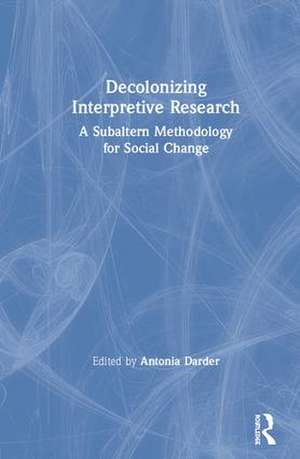Decolonizing Interpretive Research: A Subaltern Methodology for Social Change
Editat de Antonia Darderen Limba Engleză Hardback – 11 iun 2019
Decolonizing Interpretive Research outlines a form of oppositional study that undertakes a critical analysis of bodies of knowledge in any field that engages with issues related to the lives and survival of those deemed as other. It focuses on creating intellectual spaces that will facilitate new readings of the world and lead toward change, both in theory and practice. The book begins by conceptualizing the various aspects of the decolonizing interpretive research approach for the reader, and the following six chapters each focus on one of these issues, grounded in a specific decolonizing interpretive study.
With a foreword by Linda Tuhiwai Smith, this book will allow readers to not only engage with the conceptual framework of this decolonizing methodology but will also give them access to examples of how the methodology has informed decolonizing interpretive studies in practice.
| Toate formatele și edițiile | Preț | Express |
|---|---|---|
| Paperback (1) | 361.08 lei 6-8 săpt. | |
| Taylor & Francis – 11 iun 2019 | 361.08 lei 6-8 săpt. | |
| Hardback (1) | 997.11 lei 6-8 săpt. | |
| Taylor & Francis – 11 iun 2019 | 997.11 lei 6-8 săpt. |
Preț: 997.11 lei
Preț vechi: 1215.98 lei
-18% Nou
Puncte Express: 1496
Preț estimativ în valută:
190.80€ • 196.84$ • 159.22£
190.80€ • 196.84$ • 159.22£
Carte tipărită la comandă
Livrare economică 27 martie-10 aprilie
Preluare comenzi: 021 569.72.76
Specificații
ISBN-13: 9781138486607
ISBN-10: 1138486604
Pagini: 154
Dimensiuni: 156 x 234 x 11 mm
Greutate: 0.36 kg
Ediția:1
Editura: Taylor & Francis
Colecția Routledge
Locul publicării:Oxford, United Kingdom
ISBN-10: 1138486604
Pagini: 154
Dimensiuni: 156 x 234 x 11 mm
Greutate: 0.36 kg
Ediția:1
Editura: Taylor & Francis
Colecția Routledge
Locul publicării:Oxford, United Kingdom
Public țintă
Postgraduate, Professional, and UndergraduateCuprins
Foreword Linda Tuhiwai Smith
Preface Antonia Darder
Part I. The Conceptual Foundation
Chapter 1. Decolonizing Interpretive Research Antonia Darder
Part II. Decolonizing Principles
Chapter 2. Centering the Subaltern Voice Kortney Hernandez
Chapter 3. Naming the Politics of Coloniality Emily Estioco Bautista
Chapter 4. Demythologizing Hegemonic Beliefs Kenzo Bergeron
Chapter 5. Epistemological Disruptions Bibinaz Pirayesh
Chapter 6. Emancipatory Re-readingsTerrelle Billy Sales
Afterword João Paraskeva
Index
Preface Antonia Darder
Part I. The Conceptual Foundation
Chapter 1. Decolonizing Interpretive Research Antonia Darder
Part II. Decolonizing Principles
Chapter 2. Centering the Subaltern Voice Kortney Hernandez
Chapter 3. Naming the Politics of Coloniality Emily Estioco Bautista
Chapter 4. Demythologizing Hegemonic Beliefs Kenzo Bergeron
Chapter 5. Epistemological Disruptions Bibinaz Pirayesh
Chapter 6. Emancipatory Re-readingsTerrelle Billy Sales
Afterword João Paraskeva
Index
Notă biografică
Antonia Darder holds the Leavey Endowed Chair of Ethics and Moral Leadership at Loyola Marymount University and is Distinguished Visiting Faculty at the University of Johannesburg. She has published numerous books and her work focuses on political questions and ethical concerns linked to racism, class inequalities, language rights, critical pedagogy, cultural studies, and Latino education. More recently, her work has sought to contend with pedagogical questions of the body and the persistent impact of coloniality on community leadership and empowerment.
Recenzii
Amongst the long-needed intersection between education and decolonization, this book offers that rare mix of theory intertwined with action. Darder makes clear that to decolonize can happen in myriad ways, but not without intention, connection, and a stance of learning.
Professor Leigh Patel, Associate Dean for Equity and Justice, School of Education, University of Pittsburgh
Decolonizing Interpretive Research audaciously brings to the fore subaltern voices that not only interrogate so-called objective lenses used to research "the other," but also offers emancipatory, humanistic, and organic ways in which the oppressed can document and tell their stories. This is a cutting-edge book that challenges western research orthodoxies while transcending disciplinary boundaries.
Professor Pierre W. Orelus, Associate Professor and Department Chair, School of Education, Fairfield University
Decolonizing Interpretive Research: A Subaltern Methodology for Social Change brings the literature of critical, anti-colonial, postcolonial studies to bear on the process and methods of research in a manner that enacts scholarly production as social action. Antonia Darder - as teacher - foregrounds the work of her students, dismantling the hierarchies of voice and power. Together they engage research as a communal process, working as "revolutionary partners" pushing through and against established limits of how research is defined. The dissident voices of the students peel back layers of the colonial matrix with each chapter; their words flowing as affirmations of social change in the making.
Professor Sandy Grande, Chair of the Education Department, Connecticut College
Professor Leigh Patel, Associate Dean for Equity and Justice, School of Education, University of Pittsburgh
Decolonizing Interpretive Research audaciously brings to the fore subaltern voices that not only interrogate so-called objective lenses used to research "the other," but also offers emancipatory, humanistic, and organic ways in which the oppressed can document and tell their stories. This is a cutting-edge book that challenges western research orthodoxies while transcending disciplinary boundaries.
Professor Pierre W. Orelus, Associate Professor and Department Chair, School of Education, Fairfield University
Decolonizing Interpretive Research: A Subaltern Methodology for Social Change brings the literature of critical, anti-colonial, postcolonial studies to bear on the process and methods of research in a manner that enacts scholarly production as social action. Antonia Darder - as teacher - foregrounds the work of her students, dismantling the hierarchies of voice and power. Together they engage research as a communal process, working as "revolutionary partners" pushing through and against established limits of how research is defined. The dissident voices of the students peel back layers of the colonial matrix with each chapter; their words flowing as affirmations of social change in the making.
Professor Sandy Grande, Chair of the Education Department, Connecticut College
Descriere
Decolonizing Interpretive Research focuses on creating intellectual spaces that will facilitate new readings of the world and lead toward change, both in theory and practice.


























